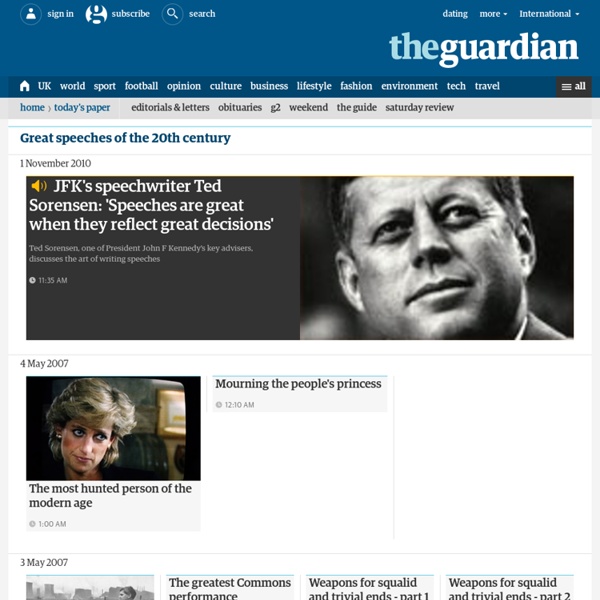



SoJust.net: Social Justice and Civil Rights Speeches Bella AbzugPlenary Address, Fourth World Congress on Women (1995) John AdamsInaugural Address (1797) Jane AddamsThe Subjective Necessity for Social Settlements (1892)The Modern Lear (1896) Susan B. AnthonyOn Women's Right to Vote (1872) John BrownFinal Address to the Court (1859) William Jennings BryanThe White Man's Burden (1906)Imperialism (1908) Stokely CarmichaelBlack Power (1966) Carrie Chapman CattThe Crisis (1916)Speech Before Congress (1917) Chief JosephSurrender Speech (1877) Shriley ChisholmEqual Rights for Women (1969)For the Equal Rights Amendment (1970) Hillary Rodham ClintonWellesley College Student Commencement Speech (1969)Women's Rights Are Human Rights (1995) Eugene DebsStatement to the Court (1918) Frederick DouglasThe Hypocrisy of American Slavery (1852)Appeal to Congress for Impartial Suffrage (1867) Dwight D. Elizabeth Gurley FlynnMemories of the Industrial Workers of the World (1962) Betty FriedanJudge Carswell and the "Sex Plus" Doctrine (1970) Frances D. John F. Robert F.
Video Nobel Lectures from Nobel Laureates in Literature Lists of Nobel Prizes and Laureates Video Lectures from Nobel Laureates in Literature According to the Nobel Foundation statutes, the Nobel Laureates are required "to give a lecture on a subject connected with the work for which the prize has been awarded". The lecture should be given before, or no later than six months after, the Nobel Prize Award Ceremony, which takes place in Stockholm or, in the case of the Peace Prize, in Oslo on 10 December. Click on the names of the Nobel Laureates in Literature below to see their Nobel Lectures. Video Nobel Lectures in: | Physics | Chemistry | Physiology or Medicine | Literature | Peace | Economic Sciences | Video Nobel Lectures in Literature Nobel Lecture by Patrick Modiano Alice Munro: In her Own Words The 2013 Nobel Lecture in Literature was replaced by a pre-recorded video conversation with the Laureate Storytellers Nobel Lecture by Mo Yan A Programme of Texts by Tomas Tranströmer Nobel Lecture for Tomas Tranströmer Heureka! Recommended: Contact
Trump talte til den amerikanske nation dagen efter frifindelsen i rigsretssagen – her er, hvad han sagde Derfor bringer Berlingske præsident Trumps tale – uforkortet USAs præsident, Donald Trump, undgik forleden den skæbne at blive fjernet fra sit embede. Men afstemningen i Senatet udstillede, hvor splittende en figur Trump er: Med undtagelse af den republikanske senator Mitt Romney blev rigsretssagen afgjort langs de samme linjer, som skiller demokrater og republikanere. Situationen i Amerika er følgende: De, der er for Trump, er bandsat for ham. De der er imod ham, er bandsat imod ham. Når præsident Trump ikke vil give formanden for Repræsentanternes Hus, Nancy Pelosi, hånden, som tilfældet var før Trumps State of The Union-tale forleden nat, og når Pelosi efter talen rev den i stykker bag præsidentens ryg, da er det tegn på et demokrati, som trænger til et lægebesøg. Torsdag efter frifindelsen i rigsretssagen stillede Trump sig op i 75-80 minutter og talte til sine støtter. Og så er der den republikanske præsident Donald J. Af og til skal ordene i den forbindelse bare tale for sig selv.
A Call to Conscience: The Landmark Speeches of Martin Luther King, Jr. New York: IPM/Warner Books Dr. Martin Luther King, Jr., is known for being one of the greatest orators of the twentieth century, and perhaps in all of American history. In the 1950s and 1960s, his words led the Civil Rights Movement and helped change society. This companion volume to A Knock at Midnight features the landmark speeches of his career, including: "I Have a Dream"; his acceptance speech for the Nobel Peace Prize; his eulogy for the young victims of the Birmingham church bombing; and "I've Been to the Mountaintop," the last speech he gave before his death. Also featured in this text are introductions from world-renowned defenders of civil rights, who, reflecting on their own experiences, explain how they believe Dr.